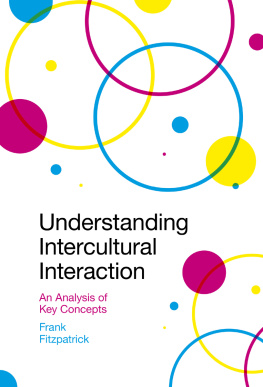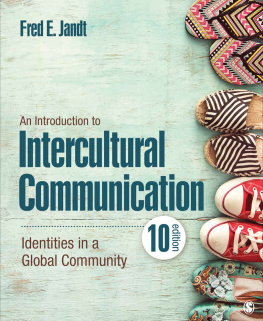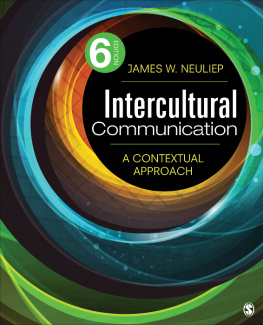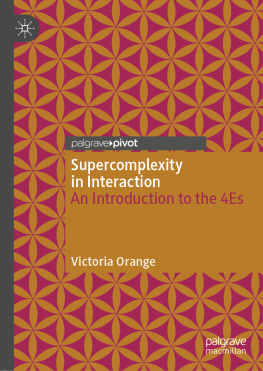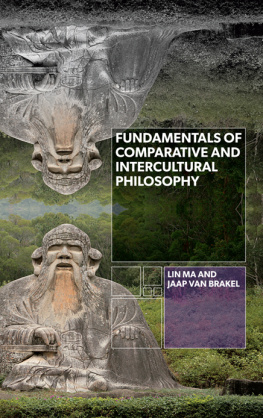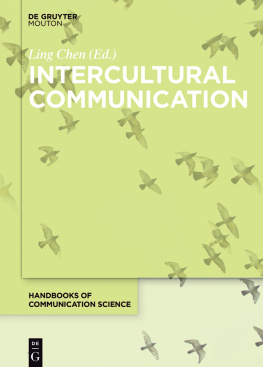Frank Fitzpatrick - Understanding Intercultural Interaction : an Analysis of Key Concepts
Here you can read online Frank Fitzpatrick - Understanding Intercultural Interaction : an Analysis of Key Concepts full text of the book (entire story) in english for free. Download pdf and epub, get meaning, cover and reviews about this ebook. year: 2020, publisher: Emerald Publishing Limited, genre: Politics. Description of the work, (preface) as well as reviews are available. Best literature library LitArk.com created for fans of good reading and offers a wide selection of genres:
Romance novel
Science fiction
Adventure
Detective
Science
History
Home and family
Prose
Art
Politics
Computer
Non-fiction
Religion
Business
Children
Humor
Choose a favorite category and find really read worthwhile books. Enjoy immersion in the world of imagination, feel the emotions of the characters or learn something new for yourself, make an fascinating discovery.
- Book:Understanding Intercultural Interaction : an Analysis of Key Concepts
- Author:
- Publisher:Emerald Publishing Limited
- Genre:
- Year:2020
- Rating:3 / 5
- Favourites:Add to favourites
- Your mark:
- 60
- 1
- 2
- 3
- 4
- 5
Understanding Intercultural Interaction : an Analysis of Key Concepts: summary, description and annotation
We offer to read an annotation, description, summary or preface (depends on what the author of the book "Understanding Intercultural Interaction : an Analysis of Key Concepts" wrote himself). If you haven't found the necessary information about the book — write in the comments, we will try to find it.
Understanding Intercultural Interaction : an Analysis of Key Concepts — read online for free the complete book (whole text) full work
Below is the text of the book, divided by pages. System saving the place of the last page read, allows you to conveniently read the book "Understanding Intercultural Interaction : an Analysis of Key Concepts" online for free, without having to search again every time where you left off. Put a bookmark, and you can go to the page where you finished reading at any time.
Font size:
Interval:
Bookmark:
Understanding Intercultural Interaction
An Analysis of Key Concepts
Frank Fitzpatrick

United Kingdom North America
Japan India Malaysia China
Emerald Publishing Limited
Howard House, Wagon Lane, Bingley BD16 1WA, UK
First edition 2020
Copyright 2020 Frank Fitzpatrick
Reprints and permissions service
Contact:
No part of this book may be reproduced, stored in a retrieval system, transmitted in any form or by any means electronic, mechanical, photocopying, recording or otherwise without either the prior written permission of the publisher or a licence permitting restricted copying issued in the UK by The Copyright Licensing Agency and in the USA by The Copyright Clearance Center. Any opinions expressed in the chapters are those of the authors. Whilst Emerald makes every effort to ensure the quality and accuracy of its content, Emerald makes no representation implied or otherwise, as to the chapters suitability and application and disclaims any warranties, express or implied, to their use.
British Library Cataloguing in Publication Data
A catalogue record for this book is available from the British Library
ISBN: 978-1-83867-398-7 (Print)
ISBN: 978-1-83867-397-0 (Online)
ISBN: 978-1-83867-399-4 (Epub)

Dr Frank Fitzpatrick is a highly qualified and accomplished international business leader, intercultural consultant and academic. For over 25 years he has worked as an intercultural specialist extensively across several continents in complex strategic environments, successfully promoting intercultural awareness and collaboration amongst diverse groups of people from different cultural backgrounds. He has a PhD in Cross-Cultural Communication and Masters degrees in Business Administration and Linguistics.
This book is aimed at students and professionals who wish to deepen their knowledge of how people interact in intercultural contexts by providing an overview of key concepts from a breadth of perspectives. Living, working and studying in intercultural and international contexts is ever more relevant to everyone, whether as language educators or students of social sciences, men and women working in international business and human resources or professionals dealing with issues in international relations and international development and specialist sectors such as industry, diplomacy, health and education, among others. As education and work become increasingly international, every student and professional at some point is likely to feel the need to explore and discuss concepts of culture and identity in order to be prepared for intercultural encounters in the globalised workplace, not least to understand themselves and the role that they play in their own society and on the international stage. For this, they will need the opportunity to be informed on and to explore notions of culture and identity and how they relate to their lives and future work. This book, then, brings together the most important and widely used concepts and theories relating to intercultural interaction in an informative and accessible manner in order to enable students and professionals of all backgrounds to improve their knowledge and prospects for the future. This will enrich the experience of intercultural interaction, improve the quality of business policies and dealings and build tolerance and understanding of different perspectives and conditions across the world of work and study.
The terms intercultural and cross-cultural are both used in the concepts in this book, but they are treated differently. Cross-cultural refers to comparative studies of behaviour across different cultural settings, whereas intercultural refers to interaction between people from different cultural backgrounds within a particular context. For example, a cross-cultural analysis of how meetings are conducted might identify different forms of address, levels of formality or status, the use of non-verbal cues and so on, in different cultural contexts. However, an intercultural analysis would focus on how individuals from different backgrounds actually behave and interact with each other when they meet and would analyse the outcomes of intercultural contact. In this sense, both levels of scrutiny have relevance depending on the focus of analysis.
The focus of this book is both intercultural and cross-cultural in that, on the one hand, it refers to contexts where individuals and groups from a variety of cultural backgrounds and perspectives interact and navigate interculturality. This would include international business contexts, situations of migration or international study and so on, where there are perceived to be cultural differences in the way that people live, study or do business. However, there is also a cross-cultural focus in some of the concepts as they refer to the processes involved in moving from one context to another or preparing for this move, such as in cross-cultural adjustment or cross-cultural training. These concepts also create a link with issues in cross-cultural management, which has been prolific in generating an enormous volume of research, theory and practice for international business situations, much of which is explained and critiqued in this book.
The approach adopted in this book, then, draws upon concepts and theories across the spectrum and makes intercultural and cross-cultural concepts and issues relevant and accessible to all groups of students and professionals, regardless of background. It allows them to engage with the widest possible forum of contributors in their quest to position themselves in the wider arena of intercultural studies. Above all, it is important that individuals from diverse backgrounds and interests have a common understanding and common language to be able to speak to one another and debate their point of view.
Intercultural encounters take place across a wide variety of sites, for many different purposes, involving people from many different backgrounds, and can be motivated by a number of factors. Engaging with others from different cultural backgrounds may be voluntary, as in the case of international business people or professionals relocating for work, or involve negotiating business transactions or students attending university in another country. According to the reports of United Nations agencies, since 2009, the growth rate of trade in developing economies has almost doubled, increasing substantially in relation to that of developed economies to the extent that the value of trade is now virtually equal in developing and developed countries as emerging economies seek to catch up with wealthier ones in their share of global trade. Likewise, international education has seen spectacular growth. According to a recent report by the British Council, in the past ten years the number of internationally mobile Higher Education students has risen from two million to over five million as countries seek to internationalise their economies and societies. In addition to this, the United Nations International Migration Report indicates that there are currently more than a quarter of a million migrants across the world, more than a 40% increase since 2000 and the highest number ever.
Font size:
Interval:
Bookmark:
Similar books «Understanding Intercultural Interaction : an Analysis of Key Concepts»
Look at similar books to Understanding Intercultural Interaction : an Analysis of Key Concepts. We have selected literature similar in name and meaning in the hope of providing readers with more options to find new, interesting, not yet read works.
Discussion, reviews of the book Understanding Intercultural Interaction : an Analysis of Key Concepts and just readers' own opinions. Leave your comments, write what you think about the work, its meaning or the main characters. Specify what exactly you liked and what you didn't like, and why you think so.

